The Rebels are a band, and later an army of escaped slaves
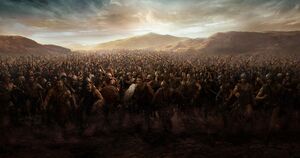
The Rebel Army.
and gladiators, in rebellion against the Roman Republic in the conflict known as the Third Servile War. The Rebels are lead by Spartacus, as his decisions ultimately determine the actions the Rebels take.
Spartacus, Crixus, and Agron later serve as the Rebel Generals during the growth of the rebellion, while Gannicus eventually serves as one towards the end.
Blood and Sand[]
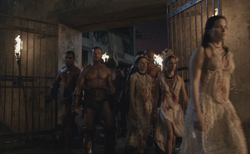
Spartacus, Gladiators and Slaves leaving the Ludus.
The rebellion first began on the evening of the Massacre at the House of Batiatus. About 40 gladiators were divided between two separate leaders at the time: Spartacus and Crixus. The Gauls with Crixus, and only a handful with Spartacus. Most house slaves did not participate in the bloodshed. Though divided, they all ultimately belonged to the same Brotherhood, with Spartacus himself being the true leader.
As Roman law required that all the household slaves be put to death, even if only one of their number was to kill their master, most of the domestic slaves of the House of Batiatus, despite taking no part or having any foreknowledge of the gladiator uprising, had no other recourse but to follow the gladiators into outlawry. Other slaves who were present, such as the body slaves belonging to the guests in attendance at the ludus, may have tagged along with the other escapees as they followed Spartacus and Crixus into the rebellion.
Vengeance[]
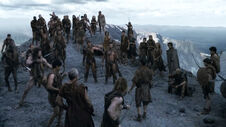
The Rebel Army atop Vesuvius.
During the time frame of Season Two, the Rebels battled against and defeated mercenaries of the roman noble Seppius.
The Rebels number mostly comprised of Gallic gladiators, making up half of the Rebel numbers only growing slightly. However, over the course of the second season, the Rebel numbers fluctuate. It reached a new height with the recruitment of the Germanic warriors, doubling their forces in a single day. During this time, the leadership follows an uneasy heirarchy. Some do not look to Spartacus as their true leader, but instead to other rebels, such as Crixus or Agron. This friction causes an unofficial chain of command amongst themselves. Throughout most of the second season, the Rebels settle themselves at the base of Mt. Vesuvius, positioning their encampment within its temple.
Following a friendly bout, they slowly came together and the spirit of teamwork helped in a battle that resulted in the capture and death of Praetor Varinius and his forces. The rebels gained a stockpile of weapons from this victory. They faced a new threat and were forced to abandon the temple when they are bombarded and overrun by the forces of Glaber.
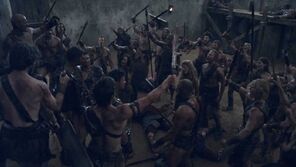
The Rebel Army at the end of Vengeance.
Having no other option, the Rebels retreated up the rocky slopes of Mt. Vesuvius and set up a base camp upon the summit of the dormant volcano. Trapped atop the mountain and facing starvation, the Rebel generals formulated a daring surprise attack wherein they would repel down the face of the mountain using ropes improvised from vines and then turn the Roman artillery upon the Romans themselves. This attack went as planned and the Rebels were able to destroy both Glaber and his army. and the Praetorian armies of both Gaius Claudius Glaber and Publius Varinius. These victories, coupled with their growth in size due to liberating villa's and freeing the Germans, would add much needed credibility to Spartacus' rebellion, and put them on the path toward becoming the greatest army of freed slaves the world would ever see.
Between Vengeance and War of the Damned[]
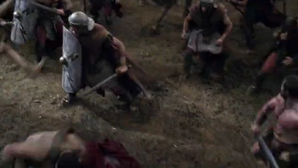
Some Rebels attacking the Mines.
Following the Battle of Vesuvius, the Rebel army liberated The Mines and other places under Roman control to reach thousands of forces in Season Three and defeated several Roman leaders, such as the forces of the Quaestor, Scrofa. As their numbers continue to grow, children are now abundant among the encampment. Women now commonly fight alongside the men for the cause.
With Spartacus' continued victories, many Rebels are now more faithful to the cause, strenghtening Spartacus' position and ultimately uniting all of the Rebels under a single command. Throughout time, however, the Rebels have also grown to become merciless, with only a handful holding to a code of moral ethics, in regards to anyone that is Roman or not part of their cause.
War of the Damned[]
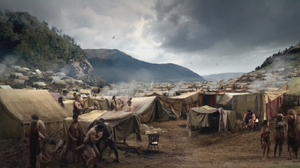
The rebel encampment before Sinuessa.
As the Rebels grow to become a much greater threat and the constant defeats, Rome sends the Praetor, Cossinius and his Tribune, Furius to put an end to the rebellion. While they prove they are no fools, the Rebels still manage to best them in battle and in the end, Spartacus and his Rebels defeat this force and see another victory against Rome.
The Rebels later successfully take the Roman city of Sinuessa and begin using it as a temporary place to stay in order to survive the upcoming winter. Following their taking of the city, the Rebels learn that they are will soon be pitted against the largest army they've ever faced, and a commander who may finally see the rebellion put down.
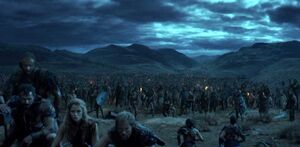
The Rebel Army prepare to attack Sinuessa.
During their stay at Sinuessa, the Rebels form an alliance with a group of Cilician Pirates in order to ensure proper food and supplies is maintained throughout their stay.
Tensions, however, returns to the Rebels as they become divided bewteen the majority (Such as Crixus, Naevia, Nemetes and Brictius) who believe that all Romans should be slain regardless of threat or innocence and the minority (Spartacus, Agron, Gannicus, Nasir, Sibyl, Donar, and Saxa) who do not hold desire to see unnecessary bloodshed. Crixus eventually spurs the Rebels into a frenzy and slaughter what Roman prisoners remain. After Spartacus learns of this he puts and end to the matter and saves what Roman prisoners remain. He later admonishes Crixus and it soon become apparent that a leadership struggle has resumed.
The Rebels are eventually betrayed by the Cilician Pirates (excluding Castus who joins the rebellion) and the forces of Marcus Licinius Crassus begin their assault on Sinuess en Valle. During this time, Nemetes is killed by Caesar and Donar is captured and fights Caesar who bests him, however Donar commits suicide rather then die by the leader's hand. The Rebels are then beaten back and they are forced to abandon the city and retreat into the northern mountains where they make camp following their loss.
While camped in the cold mountains
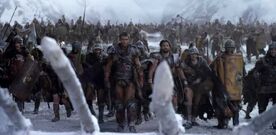
The Rebel Army in the mountains.
and trapped by Crassus' wall, the Rebels lose hundreds or perhaps even thousands in numerous failed attempts to breach the wall. Still yet another thousand are lost due to a sudden snowstorm. Spartacus and Crixus are divided in what should be done, but eventually the Rebels make a successful assault on Crassus' wall and manage to escape the mountains.
Crassus' army continues it's pursuit and the Rebels and constantly having to be on the defensive. Spartacus and Crixus once more clash on what to do and eventually the two mutually agree to take separate paths with Crixus moving towards Rome and Spartacus to escape over the Alps. The Rebels take a village and use it for one night to celebrate together one last time before departing.
Crixus' Army[]
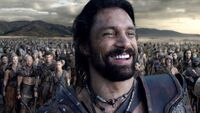
Crixus and his army.
Crixus and his army terrorize Rome and slay many Roman commanders and defeat many armies.
They eventually find Rome in their sights and the forces of Arrius being the only force left in their way.
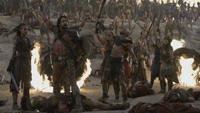
Crixus's army defeating Arrius' forces.
They defeat Arrius, before setting eyes on conquering Rome but the forces of Crassus, which were believed to have been after Spartacus, attack at them.
Crixus orders his army to charge, but the forces of Crassus are so great in numbers that the Rebels are eventually defeated. It is too late that Crixus realizes this and, during his fight with Julius Caesar, he is stabbed from behind by Tiberius.
With his defeat, Crixus is beheaded and his army is destroyed. 500 Rebels survive the onslaught, some of which are subject to physical abuse. They are later offered in trade for Tiberius, who had been captured by Spartacus. Following this, they rejoin Spartacus as part of his army.
Spartacus' Army[]
While Spartacus' forces contain the more skilled Rebels, they are too few in number of actual combatants and Spartacus moves on the path towards the Alps where he hopes to have his people embrace true freedom outside the Republic, as he realizes now that there is no way that they will be able to defeat Crassus at their current standing.
The Rebels take to making camp in the mountains. There they receive word from a surviving Naevia who was sent to them with Crixus' head as a reminder of their loss by Crassus. They also discover that another Roman general, Gnaeus Pompeius Magnus, may be entering the Republic once more, thus putting two armies down upon them.
To honor Crixus and the fallen, Spartacus and the Rebels capture several Romans, along with Crassus' son, Tiberius, and hold a makeshift arena, with the Rebels pitted against the Romans. As all the Romans fall and Tiberius fights Naevia, Julius Caesar is sent with an offer of 500 of Spartacus' men for Tiberius. Although Tiberius loses his match, Naevia lets him survive for the greater cause, and these terms are agreed upon. However, Kore, Crassus' former body slave, kills Tiberius in vengeance, therefore putting the deal in jeopardy. Instead, Kore goes with Caesar to honor the deal, with herself as part of the trade.
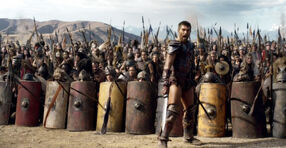
The last stand of Spartacus and the Rebel Army.
Following the return of the surviving Rebels, a pyre is held with Crixus' head upon it. There the Rebels chant the names of the fallen before continuously shouting Crixus. Spartacus then declares they will move on one final battle.
The Rebels prepare for a final confrontation with Crassus and his army. While the combatants would fight until the bitter end, the non-combatants will escape over the mountains into freedom. The battle soon commences. The Romans hold superior numbers, yet Spartacus again shows ingenuity by having a trap-filled trench dug in the battlefield beforehand and by having Gannicus lead a cavalry attack on the Roman artillery from behind.
The battle, however, ends in a Roman victory, resulting
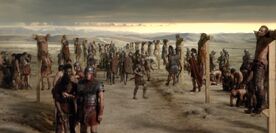
Captured Rebels are crucified along the Appian Way.
in many Rebels killed or captured and Spartacus fatally wounded, but carried from the field.
The captured Rebels are placed upon crosses along the Appian Way as a warning to all slaves who would think about revolting. Many Rebels who attempted to escape north were slaughtered by Pompey, who is also declared the victor of the war, instead of Crassus.
A few remaining survivors had waited at the mountains for Spartacus to return. After giving a short final speech, Spartacus dies from his injuries, and buried as it begins to rain. Led by Agron, the surviving Rebels leave the Republic and embrace true freedom in the mountains.
Rebel Life[]
Within the ranks of the Rebels, any person is free to do as they please, which also includes the option of leaving. This rarely happens however, with only one person, Aurelia seen doing so. Originally, most of the men were gladiators, though there are some that are not, and are also not among the fighters of the Rebel ranks. In Season Two, most of the women are not trained in combat, so they support the gladiators in what ways they can, such as weaving, cleaning, and most recently archery. There are also those who struggle clinging to the life of being a slave. They are doubtful of the Rebels' cause, knowing nothing but slavery for their entire lives.
Armor and Weaponry[]
The Rebels' supply their weaponry with that of fallen Roman soliders. Later, they have grown to using makeshift armor that they use in battle in order to engage the Roman military on equal footing. Most of the armor consists of leather whilst being mixed together with Roman military armor from the soldiers they have slain.
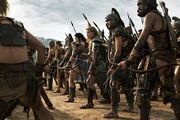
Rebel Archers.
Swords, axes, warhammers, spears, bows and arrows, nets and daggers are all weapons utilized by the Rebels. This large array of weapons aids in their defeating Romans who mainly use swords and spears. The weapon of choice is dependant upon the combatant with some Rebels being more skilled than others in certain aspects. Upon taking the city of Sinuessa, the Rebels make an affiliation with a blacksmith named Attius. In exchange for coin, he constructs more weapons to supply Spartacus' ever increasing army.
Combat Style[]
The Rebels are a surprisingly effective armed force, repeatedly besting the trained Roman military, assassins and mercenaries sent after them. Due to their small numbers in Season Two, however, the Rebels mainly use tactics of surprise or "hit and run" against the numerically superior Roman forces. Nevertheless, the Rebels' continued victories have caused a growing alarm to Rome and its people. When their numbers grew, however, the combat teaching became more minimal to that where the ordinary Rebel warrior is on par or slightly above ordinary Roman soldiers.
All Rebels are trained in the ways of combat and many become more skilled in time during their direct confrontations in battle and their own adaptations to many styles of blood and battle.
Camp Followers[]
Camp followers are the civilian element within the rebel army, comprise a large percentage of the rebels. These people are composed of non-combatants, usually the elderly, the disabled, mothers, prostitutes and children too young to fight. Though Spartacus' initial intention was to destroy Rome, the presence of so many helpless people flocking to his banner was the main reason why he would err on the side of caution when faced by the Romans. When his force arrived at the Alps, Spartacus, along with thousands of his remaining warriors, were committed to laying down their lives, so the many camp followers and those warriors tasked with defending them, could taste freedom outside the lands of the Republic of Rome. Most of the non-combatant portion of Spartacus' army were killed after being ambushed by Pompey, but a handful of survivors are able to escape over the Alps and to freedom.
Notable Rebels[]
Surviving[]
- Agron
- Nasir
- Sibyl
- Laeta
- Belesa
- Rebel Mother
- Pollux
- Lydon
- Timocles
- Tyronius
- Euclid
- The Veteran
- Lysandros
- Leviticus
- Adal
- A few hundred other Rebels
Deceased[]
- Hamilcar (Killed by Batiatus' Men)
- Duro (Killed by Batiatus' Men)
- Medicus (Died of Sickness)
- Peirastes (Killed by Glaber's Men)
- Aurelia (Died of Wounds Inflicted by Glaber's Men)
- Mannus (Killed by Ashur)
- Plenus (Killed by Ashur)
- Vitus (Killed by Marcus)
- Tychos (Killed by Glaber's Men)
- Sophus (Killed by Glaber's Men)
- Fortis (Killed by Glaber's Men)
- Liscus (Killed by Ashur)
- Acer (Tortured by Romans, Killed by Ilithyia)
- Rhaskos (Executed by Mycter)
- Chadara (Traitor, Killed by Mira)
- Lucius Caelius (Killed by The Egyptian)
- Fulco (Killed by Varinius' Men)
- Camila (Killed by Glaber's Men)
- Mira (Killed by Salvius)
- Harudes (Killed by Glaber)
- Oenomaus (Killed by The Egyptian)
- Pyrrhus (Killed by Scrofa or Cossinius's Men between Vengeance and War of the Damned)
- Diotimos (Killed by Laurus)
- Totus (Killed by Tiberius)
- Attius (Falsely accused to be a Traitor, Killed by Naevia)
- Sanus (Killed by the Cilician Pirates)
- Nemetes (Killed by Caesar)
- Vertiscus (Killed by Caesar)
- Donar (Suicide)
- Hundreds killed in Sinuessa by Crassus and his troops.
- Hundreds killed trying to cross Crassus' wall.
- Theologidis (Killed by Crassus' Men)
- Around 1,000 died of a viscious storm.
- Some killed by Crassus's scouts.
- Verenda (Killed by Crassus' Men)
- Ortius (Killed by Crassus' Men)
- Brictius (Killed by Caesar)
- Crixus (Killed by Tiberius)
- Lugo (Burned by Ballista Fire)
- Castus (Killed by Crassus' Men)
- Saxa (Killed by Crassus' Men)
- Naevia (Killed by Caesar)
- Correus (Killed by Crassus' Men)
- Pleuratos (Killed by Crassus' Men)
- Kore (Crucified)
- Gannicus (Crucified)
- Litaviccus (Crucified)
- Kraynos (Crucified)
- Spartacus (Succumbed to Wounds Inflicted by Crassus' Men)
- 6,000 Crucified by Crassus
- 5,000 Killed by Pompey
Unknown Status[]
Slaves named deceased before to be officially Rebels[]
Historical Context[]
- There was another rebel by the name of Publipor (meaning "slave of Publius"), and is only briefly mentioned in one source.
- According to Plutarch, the Rebel numbers were about 78 when the rebellion first began. This number eventually grew into a band of over 60,000 men, women, and children. Other sources say it grew to 90,000 or 120,000. Although this number was perhaps an exaggeration caused to bolster Crassus' reputation.
- After the Gladiators, one of the more important types of recruit in Spartacus' army would have been Pastores (pastors, or shepherds), who were slaves permitted freedom of movement, as to herd cattle, sheep or goats across the country. They were also armed and travelled in groups, so as to deter thieves from their herds, and may have been employed by their masters as a form of law-enforcement among the agricultural slaves or tenant-farmers on their master's estate.
- Historically, after Crixus left Spartacus to fight the rebellion on his own, he took 30,000 Rebels with him. Over 20,000 were killed by Cornelius Lentulus and Gellius Publicola.
- At the end of the war, 6,000 Rebels were crucified by Crassus and 5,000 were killed in a small battle by Pompey Magnus in the north.
- Ashur mentions the rebels' visit at Atella. Historically, after defeating Cossinius and Furius at Nuceria, the rebels travelled to Atella, where a battle and later the siege of this city occured.
- The army consisted of many different races (Mostly Gauls, Germans, Thracians and Greeks). Since many of the rebels didn't speak the same language, they had to learn how to communicate through one language (most likely Latin). The Romans drew there many slaves from all across the Mediterranean world and beyond:
- Apart from the Celts (Gauls, Boii, Belgae, Celtiberians and Galatians), Thracians, Germanics and Greeks, other nations and ethnicities in Spartacus' army would have been the Iberians of Spain, Illyrians of the Adriatic coastlands of the Balkans, the Scythian/Sarmatians from the Russian Steppes and the Pannonians from modern Hungary and Serbia.
- There would also have been from Anatolia (modern Turkey) the Carians, Phrygians, Lydians, Cappadocians, Isaurians and the Cilicians.
- From the Near East were the Aramaic-speaking Syrians/Assyrians and Mesopotamians, Phoenicians, Judeans and the Arabic Nabateans (from Jordan). Iranian-speakers such as the Parthians, though a great regional power during the period, may have been among Rome's vast slave population.
- Africa would have provided to the Roman slave markets the Egyptians, the Nubians of Kush, the Axumites of Ethiopia and the Nilo-Saharan nomadic tribes of the Blemmyes and Nobatae. There were also the Multi-ethnic Berbero-Saharan tribes of the Numidians (Tunisia and Algeria), the Mauri (Morocco), the Garamantes (Libyan Fezzan) and the Gaetulians (Atlas Mountains). Lighter-skinned Berber Africans were known as "Libyans" by the Romans, while Black Africans were referred to as "Aethiopians".
- Romans of lower social status are recorded as fighting for the rebel cause. One of the historical Rebel leaders of the Third Servile War was a Roman called Castus. Even members of the provinicial nobility in Italy had collaborated with Spartacus, such as one Publius Gavius, a Roman merchant in Sicily who was charged and executed for acting as a spy for the rebels. Many local Italian communities would have likely resented the Roman victory of the Social War sixteen years earlier and saw in the slave rebellion an opportunity to reassert their autonomy from Rome.
Trivia[]
- Many of the notable gladiators and Rebels consist of the stunt team of the series.